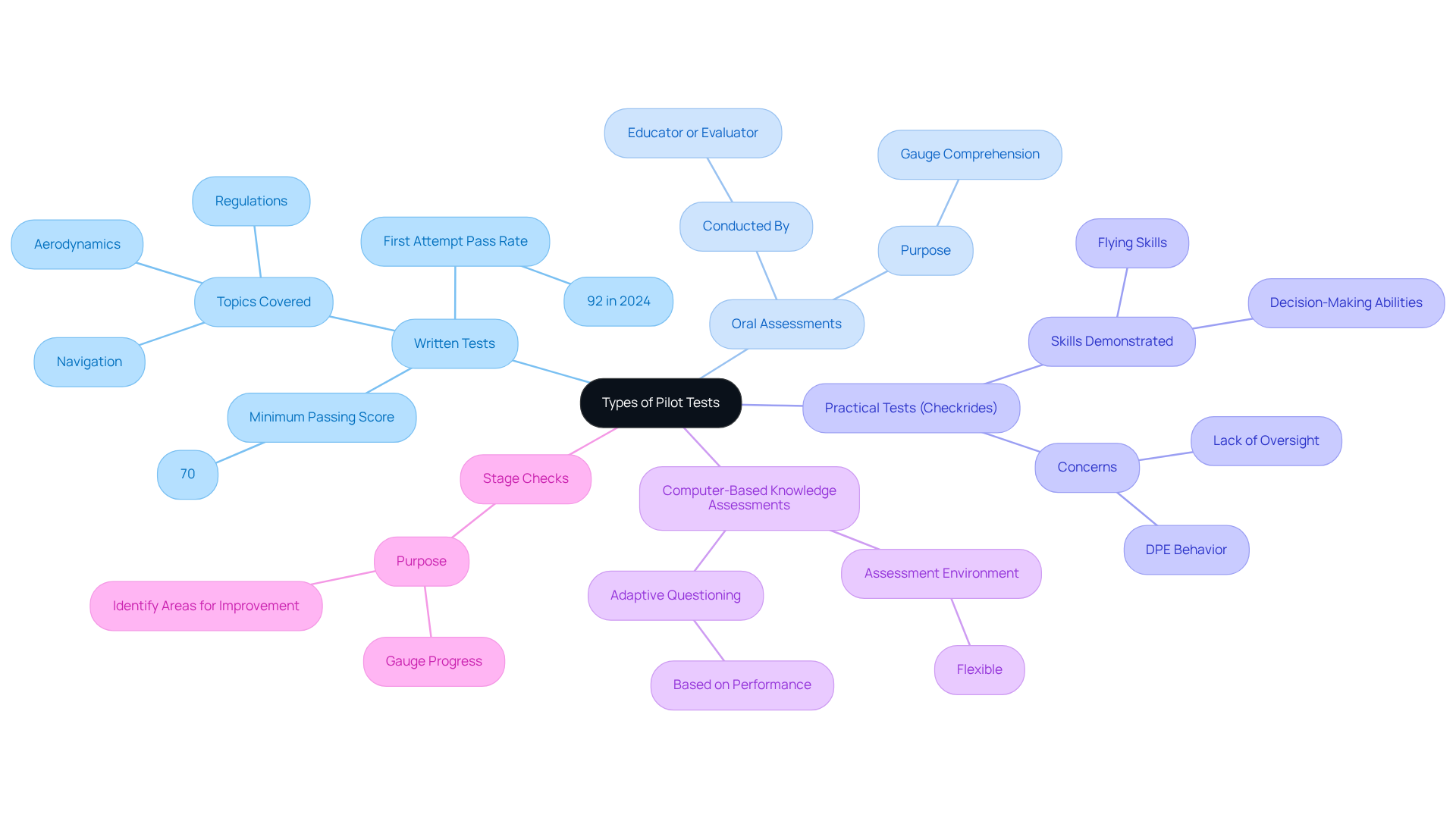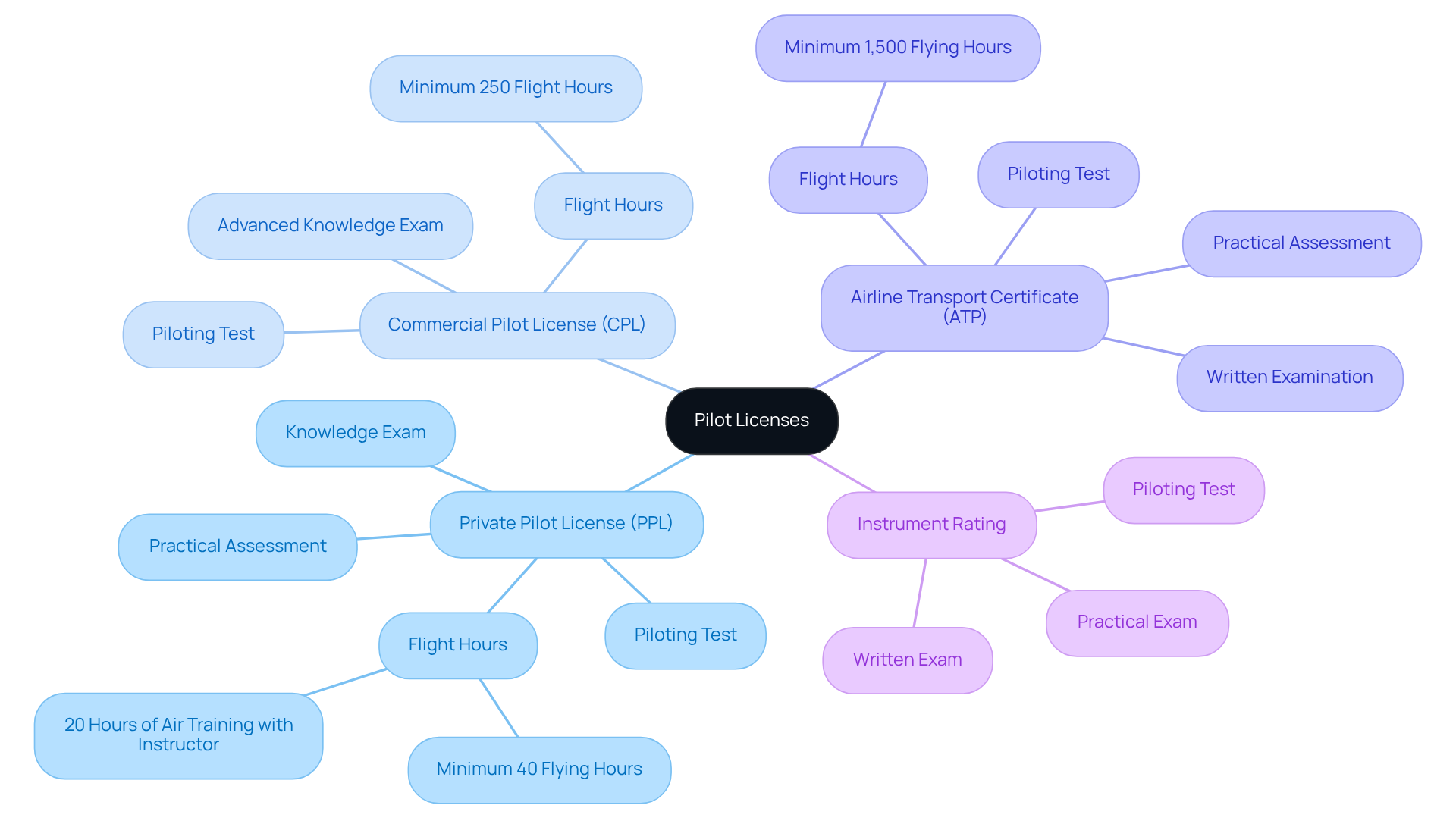
Overview
Aspiring pilots must master the essential steps to succeed in their piloting tests. This involves a comprehensive understanding of the various assessments required, including:
- Written exams
- Oral assessments
- Practical tests
Thorough preparation is paramount. Structured study schedules, utilization of FAA resources, and engagement in practice tests significantly enhance candidates' chances of success. By implementing these strategies, aspiring pilots can confidently approach their tests, equipped with the knowledge and skills necessary to excel.
Introduction
Aspiring pilots embark on a challenging journey marked by a myriad of assessments, each meticulously designed to evaluate the distinct skills and knowledge essential for safe flying. Understanding the various types of pilot tests—ranging from written exams to practical checkrides—is crucial for effective preparation. This knowledge can significantly alleviate the anxiety often associated with these challenges.
With so many components to master, how can one ensure success in passing these pivotal evaluations? This guide explores the essential steps and strategies that aspiring aviators can employ to navigate their training, ultimately emerging as confident, competent pilots.
Understand the Types of Pilot Tests
Aspiring aviators must familiarize themselves with the diverse assessments, such as the piloting test, they will encounter during their training, each designed to evaluate distinct skills. These assessments include:
- Written Tests: These cover essential topics such as aerodynamics, navigation, and regulations. Typically, a minimum passing score of 70% is required, reflecting a solid understanding of foundational concepts. Recent statistics reveal that over 92% of Private Pilot candidates successfully passed their written exams on the first attempt in 2024, underscoring the effectiveness of structured study and practice.
- Oral Assessments: Conducted by an educator or evaluator, these assessments gauge a trainee's comprehension of aviation principles and regulations through verbal inquiry, enabling a more comprehensive examination of the candidate's knowledge.
- Practical Tests (Checkrides): This hands-on evaluation necessitates candidates to exhibit their flying skills and decision-making abilities in real-time scenarios. Candidates must execute specific maneuvers and manage emergencies according to FAA standards, demonstrating their readiness for solo flight. Concerns have emerged regarding the behavior of Designated Pilot Examiners (DPEs) and the lack of oversight, which could influence the evaluation process.
- Computer-Based Knowledge Assessments: Increasingly prevalent, these evaluations offer a flexible assessment environment and often utilize adaptive questioning based on the participant's performance, establishing a modern approach to aviation assessments.
Moreover, periodic assessments known as stage checks are integral to pilot training programs. They help gauge progress and identify areas for improvement before final exams. Understanding these assessments, particularly the piloting test, is crucial for effective preparation and can significantly reduce anxiety on exam day. As instructors emphasize, thorough preparation for written tests can lead to higher pass rates. Furthermore, engaging in mock checkrides can enhance an applicant's readiness for the oral exam component of their upcoming checkride. By incorporating these practices into their training, aspiring aviators can establish a stronger foundation for success.

Identify Required Pilot Tests
To become a pilot, several assessments must be completed, including a piloting test, each differing by the type of license sought. Understanding these requirements is crucial for aspiring aviators to tailor their training effectively for the . Here’s a detailed breakdown:
- To earn a Private Pilot License (PPL), it is necessary to pass a written knowledge examination, a practical assessment, and a piloting test, along with completing a minimum of 40 flying hours, which includes 20 hours of air training with an instructor.
- For the Commercial Pilot License (CPL), candidates must pass a more advanced written test and a piloting test, while also accumulating at least 250 flight hours, building on the PPL. This level of experience is essential, as it equips aviators for the complexities of commercial flying. As noted by aviation experts, preparation is paramount; as Chuck Yeager famously stated, "Becoming a skilled aviator requires hard work and a lifetime of learning."
- The Airline Transport Certificate (ATP), as the pinnacle of aviation certification, necessitates a written examination, a practical assessment, and a minimum of 1,500 flying hours, including a piloting test, to ensure that aviators are thoroughly prepared for the demands of airline operations.
- The instrument rating requires aviators to pass a piloting test, which includes both a written and practical exam, allowing them to operate under instrument flight rules (IFR) and improving their navigation skills in various weather conditions.
Moreover, possessing a quality timepiece with the appropriate features is crucial for aviators, fulfilling both practical and aesthetic roles in the cockpit. Additionally, excelling in meteorology, including reading weather reports and forecasts, is vital for making informed flight decisions. Incorporating these elements into your training will provide a more comprehensive preparation for the piloting test.

Implement Strategies to Pass Your Pilot Tests
To successfully pass your piloting test, it is essential to implement effective strategies that will and increase your chances of success.
- Create a Study Schedule: Designate specific times for studying each subject area. Consistency is crucial for retaining information and building a solid foundation.
- Utilize FAA Resources: Leverage official FAA study materials, such as handbooks and practice evaluations, to familiarize yourself with the exam format and content. The FAA Knowledge Test consists primarily of multiple-choice questions, making these resources essential for understanding the structure of the tests and the topics covered.
- Join Study Groups: Collaborating with fellow students can significantly enhance your understanding and provide diverse perspectives on challenging topics. Engaging in discussions can clarify concepts and reinforce learning.
- Practice with Simulators: Flight simulators offer a controlled environment to practice maneuvers and emergency procedures, significantly boosting your confidence and readiness for real flight scenarios.
- Take Practice Tests: Regularly assessing yourself with practice tests helps identify weak areas and enhances your test-taking skills. This method not only equips you for the kinds of questions you will face but also develops familiarity with the test format.
- Stay Healthy: Make sure you are well-rested and mentally prepared on the day of the examination. Good physical health can significantly impact your performance, so prioritize sleep and nutrition leading up to the exam.
By implementing these strategies, you can enhance your preparation and increase your chances of passing your piloting test on the first attempt. Remember, effective study habits are key to mastering the material and achieving your piloting goals.

Conclusion
Aspiring pilots stand on the brink of an exciting journey, empowered by a clear understanding of the essential steps needed to master their piloting tests. This guide illuminates the various types of assessments, from written tests to practical evaluations, each designed to evaluate critical skills necessary for safe and effective flying. Recognizing the importance of these assessments not only prepares candidates for success but also instills confidence as they approach their testing milestones.
Key insights from this article emphasize the significance of thorough preparation, including:
- Creating structured study schedules
- Utilizing FAA resources
- Engaging in practice tests
By leveraging these strategies, aspiring aviators enhance their understanding of aviation principles and regulations, ultimately leading to higher pass rates. Furthermore, the importance of hands-on experience through simulators and mock checkrides cannot be overstated, as they provide invaluable practice that mirrors real-life flying scenarios.
In conclusion, the path to becoming a skilled pilot is paved with dedication, strategic preparation, and a commitment to continuous learning. As aspiring aviators embark on this journey, it is crucial to embrace each step, from mastering the types of tests required to implementing effective study techniques. By doing so, they not only prepare themselves for the challenges ahead but also lay the groundwork for a rewarding career in aviation. The skies await those ready to soar—are you prepared to take flight?
Frequently Asked Questions
What are the different types of pilot tests that aspiring aviators must understand?
Aspiring aviators must familiarize themselves with several types of assessments, including written tests, oral assessments, practical tests (checkrides), and computer-based knowledge assessments.
What do written tests cover in pilot training?
Written tests are knowledge-based evaluations that cover essential topics such as aerodynamics, navigation, and regulations, typically requiring a minimum passing score of 70%.
What percentage of Private Pilot candidates passed their written exams on the first attempt in 2024?
In 2024, over 92% of Private Pilot candidates successfully passed their written exams on the first attempt.
How are oral assessments conducted in pilot training?
Oral assessments are conducted by an educator or evaluator who asks verbal questions to gauge a trainee's comprehension of aviation principles and regulations.
What is involved in practical tests (checkrides)?
Practical tests require candidates to demonstrate their flying skills and decision-making abilities in real-time scenarios, executing specific maneuvers and managing emergencies according to FAA standards.
What concerns exist regarding practical tests and Designated Pilot Examiners (DPEs)?
There are concerns about the behavior of Designated Pilot Examiners (DPEs) and the lack of oversight, which could influence the evaluation process during practical tests.
What are computer-based knowledge assessments?
Computer-based knowledge assessments are flexible evaluations that often use adaptive questioning based on the participant's performance, representing a modern approach to aviation assessments.
What are stage checks in pilot training?
Stage checks are periodic assessments that help gauge a trainee's progress and identify areas for improvement before final exams.
How can aspiring aviators prepare effectively for their assessments?
Thorough preparation for written tests can lead to higher pass rates, and engaging in mock checkrides can enhance readiness for the oral exam component of upcoming checkrides.
FAQs











